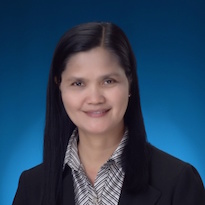GS6 Speakers
Ofelia Floresca-Domingo

Chair, Gender and Development Technical Working Group, Philippine Council for Agriculture, Aquatic and Natural Resources Research and Development, Department of Science and Technology, Philippines
Status and Outcomes of Mainstreaming Gender into Agriculture and Aquatic Research, Innovation, and Development Projects in the Philippines (download presentation here ![]() )
)
Parallel session 1: Mainstreaming Gender into Asia-Pacific’s Research, Innovation and Development Goals for more effective and sustainable outcomes
Ofelia Floresca-Domingo is a Science Research Specialist and Chairperson of the Gender and Development Technical Working Group (GAD-TWG) of the Philippine Council for Agriculture, Aquatic and Natural Resources Research and Development-Department of Science and Technology (PCAARRD-DOST), Philippines. The GAD-TWG of PCAARRD-DOST, is an intra-agency collegial body tasked to coordinate and monitor the Gender and Development Program of the Council. As Chairperson, she provides overall supervision and management of the gender mainstreaming programs, activities, and initiatives of the Council.
She leads and manages advocacy and capacity development activities for engaging researcher-scientists in integrating gender concerns in agriculture, aquatic and natural resources sectors. She has a significant role in conceptualizing and managing the Program on “Enhancing Gender-Sensitive Sustainable Agriculture and Aquatic S&T Based Livelihood Enterprise in Los Baños, Laguna: A PCAARRD and Local Government Unit Collaboration. Moreover, she represents PCAARRD in the DOST’s Task Force for planning and coordinating the GREAT Women Economic Empowerment Program of the Philippine Commission on Women and the Department of Foreign Trade and Development of Canada. Educational Attainment: Master of Science in Development Communication, major in Development Management, with PhD units in Environmental Science. University of the Philippines, Los Baños.
Summary of talk for Gender Summit 6 Asia-Pacific:
The Philippine government recognizes the role of women in nation building, hence it enacted Republic Act 9710 or the Magna Carta of Women. The law stipulates promotion of women empowerment, gender equality, equal opportunities for women and men, and equal access to resources and to development results and outcome. In compliance with the state’s policy, the Philippine’s Department of Science and Technology (DOST) is ensuring that gender concerns are integrated into the plans, programs, policies, and budgets of its attached agencies. Under the law, at least 5% of the agency’s total budget should be set aside for gender programs, projects, and activities. To further mainstream gender in research, innovation, and development goals, all attached agencies of the DOST system uses the Harmonized Gender and Development Guidelines (HGDG) for project development, implementation, monitoring, and evaluation. This is just one of the strategies to ensure the protection and fulfilment of women’s rights, promotion of gender equality, and improvement of the quality of lives of both women and men. The gender-responsive organic vegetable production development project is an example where science-based technologies served as the platform of poor communities to improve their livelihoods. This is a case where inclusive growth was clearly felt by women-beneficiaries.
